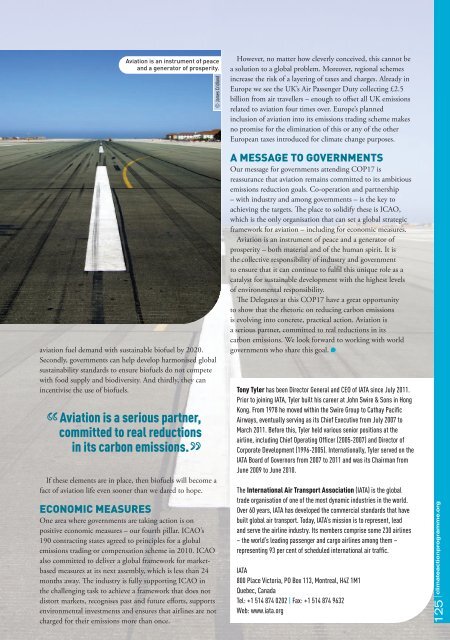Climate Action 2011-2012
Create successful ePaper yourself
Turn your PDF publications into a flip-book with our unique Google optimized e-Paper software.
Aviation is an instrument of peace<br />
and a generator of prosperity.<br />
© James Cridland<br />
However, no matter how cleverly conceived, this cannot be<br />
a solution to a global problem. Moreover, regional schemes<br />
increase the risk of a layering of taxes and charges. Already in<br />
Europe we see the UK’s Air Passenger Duty collecting £2.5<br />
billion from air travellers – enough to offset all UK emissions<br />
related to aviation four times over. Europe’s planned<br />
inclusion of aviation into its emissions trading scheme makes<br />
no promise for the elimination of this or any of the other<br />
European taxes introduced for climate change purposes.<br />
aviation fuel demand with sustainable biofuel by 2020.<br />
Secondly, governments can help develop harmonised global<br />
sustainability standards to ensure biofuels do not compete<br />
with food supply and biodiversity. And thirdly, they can<br />
incentivise the use of biofuels.<br />
Aviation is a serious partner,<br />
committed to real reductions<br />
in its carbon emissions.<br />
If these elements are in place, then biofuels will become a<br />
fact of aviation life even sooner than we dared to hope.<br />
economic meASureS<br />
One area where governments are taking action is on<br />
positive economic measures – our fourth pillar. ICAO’s<br />
190 contracting states agreed to principles for a global<br />
emissions trading or compensation scheme in 2010. ICAO<br />
also committed to deliver a global framework for marketbased<br />
measures at its next assembly, which is less than 24<br />
months away. The industry is fully supporting ICAO in<br />
the challenging task to achieve a framework that does not<br />
distort markets, recognises past and future efforts, supports<br />
environmental investments and ensures that airlines are not<br />
charged for their emissions more than once.<br />
A meSSAge to governmentS<br />
Our message for governments attending COP17 is<br />
reassurance that aviation remains committed to its ambitious<br />
emissions reduction goals. Co-operation and partnership<br />
– with industry and among governments – is the key to<br />
achieving the targets. The place to solidify these is ICAO,<br />
which is the only organisation that can set a global strategic<br />
framework for aviation – including for economic measures.<br />
Aviation is an instrument of peace and a generator of<br />
prosperity – both material and of the human spirit. It is<br />
the collective responsibility of industry and government<br />
to ensure that it can continue to fulfil this unique role as a<br />
catalyst for sustainable development with the highest levels<br />
of environmental responsibility.<br />
The Delegates at this COP17 have a great opportunity<br />
to show that the rhetoric on reducing carbon emissions<br />
is evolving into concrete, practical action. Aviation is<br />
a serious partner, committed to real reductions in its<br />
carbon emissions. We look forward to working with world<br />
governments who share this goal.<br />
Tony Tyler has been Director General and CEO of IATA since July <strong>2011</strong>.<br />
Prior to joining IATA, Tyler built his career at John Swire & Sons in Hong<br />
Kong. From 1978 he moved within the Swire Group to Cathay Pacific<br />
Airways, eventually serving as its Chief Executive from July 2007 to<br />
March <strong>2011</strong>. Before this, Tyler held various senior positions at the<br />
airline, including Chief Operating Officer (2005-2007) and Director of<br />
Corporate Development (1996-2005). Internationally, Tyler served on the<br />
IATA Board of Governors from 2007 to <strong>2011</strong> and was its Chairman from<br />
June 2009 to June 2010.<br />
The International Air Transport Association (IATA) is the global<br />
trade organisation of one of the most dynamic industries in the world.<br />
Over 60 years, IATA has developed the commercial standards that have<br />
built global air transport. Today, IATA’s mission is to represent, lead<br />
and serve the airline industry. Its members comprise some 230 airlines<br />
– the world’s leading passenger and cargo airlines among them –<br />
representing 93 per cent of scheduled international air traffic.<br />
IATA<br />
800 Place Victoria, PO Box 113, Montreal, H4Z 1M1<br />
Quebec, Canada<br />
Tel: +1 514 874 0202 | Fax: +1 514 874 9632<br />
Web: www.iata.org<br />
125 climateactionprogramme.org












